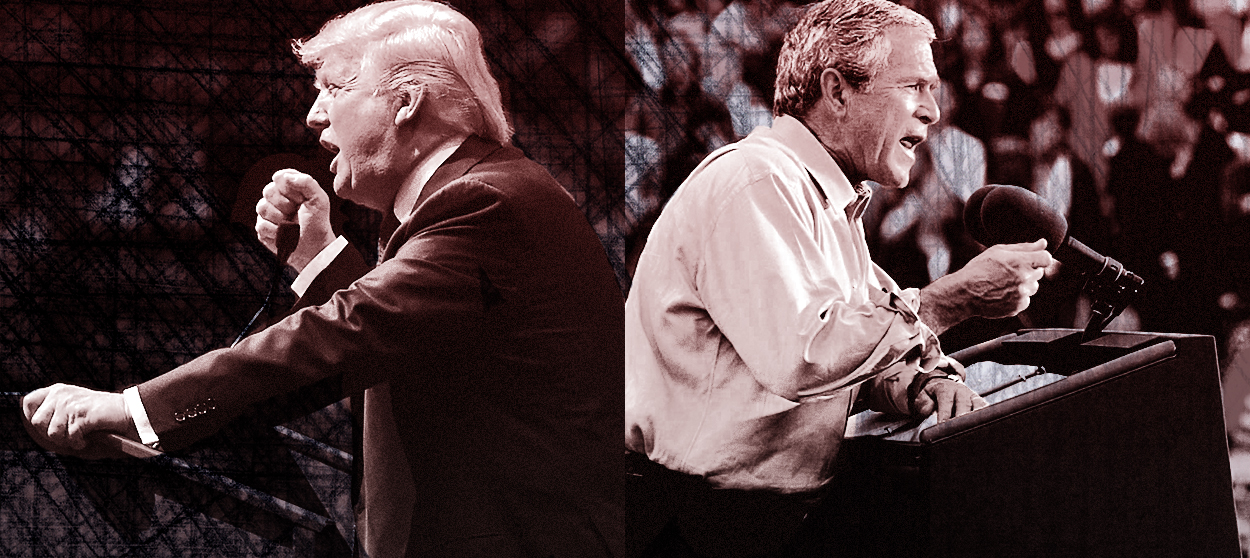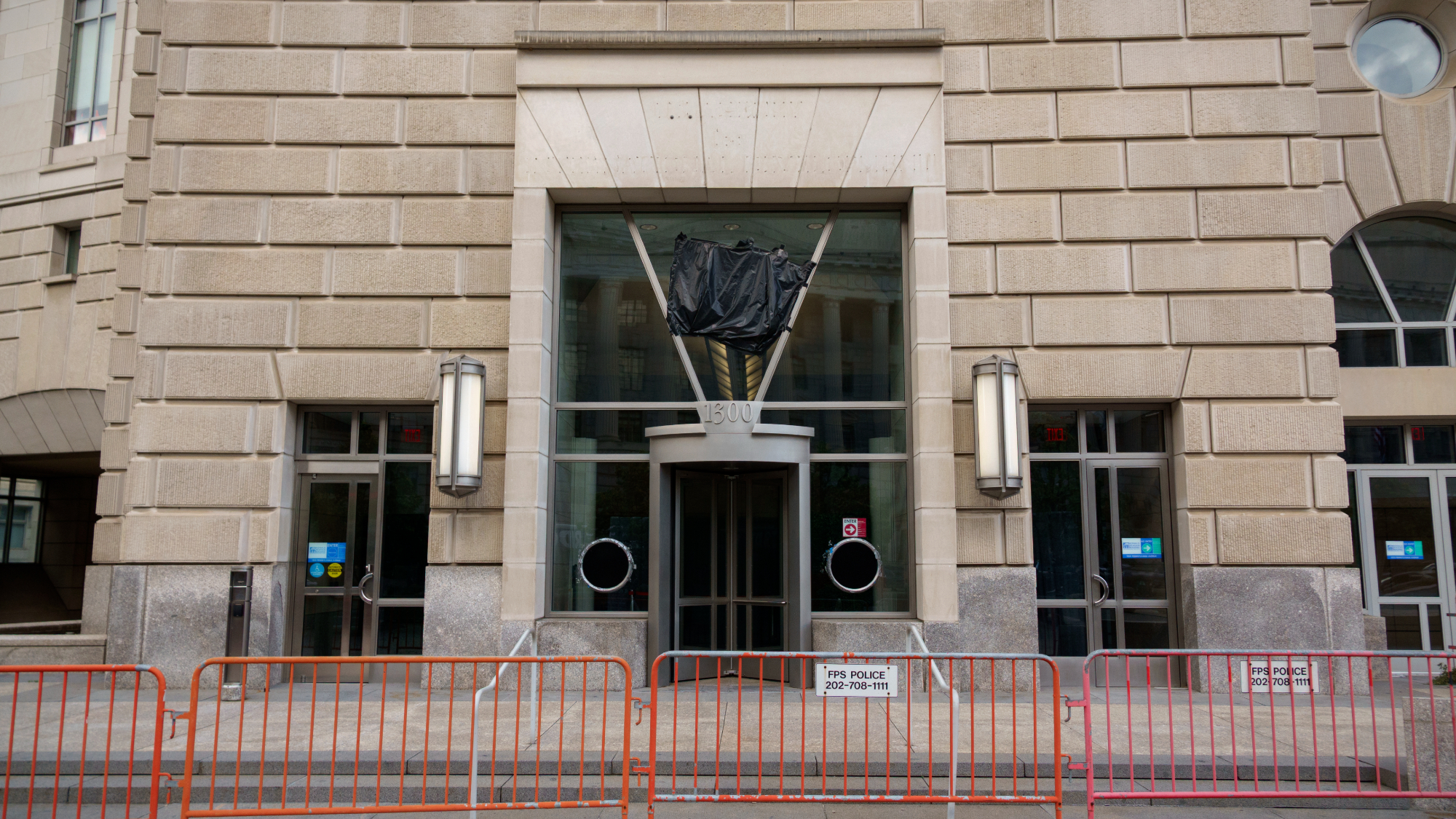Trump 2020 is Bush-Cheney '04 on steroids
George W. Bush won re-election with 4 strategic plays. Donald Trump is revamping all of them.


A free daily email with the biggest news stories of the day – and the best features from TheWeek.com
You are now subscribed
Your newsletter sign-up was successful
The 2020 presidential race is officially underway, and President Trump's re-election plan is increasingly clear — and strikingly familiar: It's a re-run of former President George W. Bush's campaign from 2004.
The similarity is ironic given Trump's long antagonistic history with the Bush family, and it's not all Trump has in common with W in their respective first terms. Both enacted tax cuts that skewed heavily toward the rich, and both were plagued by scandal and crony corruption. But these connections pale in comparison to their re-election strategy overlap, as Trump 2020 appears to be a near carbon copy of Bush-Cheney '04.
W's re-election campaign succeeded on the strength of four strategic plays. The first was stoking a relentless anxiety over terrorism, which was used to quell critique of the wars in Iraq and Afghanistan. Unseating a wartime president, Bush argued, would signal American weakness to terrorists and our military adversaries abroad. It was a choice, he liked to claim, between "staying the course" and "cutting and running."
The Week
Escape your echo chamber. Get the facts behind the news, plus analysis from multiple perspectives.

Sign up for The Week's Free Newsletters
From our morning news briefing to a weekly Good News Newsletter, get the best of The Week delivered directly to your inbox.
From our morning news briefing to a weekly Good News Newsletter, get the best of The Week delivered directly to your inbox.
The second tactic was otherizing his Democratic opponent, Sen. John Kerry (Mass.). Bush painted Kerry as a weak, out-of-touch ultra-liberal always eager to "blame America first." Kerry helped this project by going windsurfing and tying himself in knots to finesse the war politics of the day. By 2004, the Democratic base was decisively opposed to the Iraq War, but the electorate at large had yet to completely turn against the conflict. Kerry half-repudiated his initial support of the war, pleasing no one and playing into Bush's characterization of him as a wind-testing flip-flopper.
Third, Bush weaponized the issue of same-sex marriage to ally himself with so-called "family values" voters. In February 2004, he endorsed a federal constitutional amendment that would have outlawed same-sex marriage nationwide. Bush campaign strategist Karl Rove had a hand in placing anti-gay marriage amendments on the 2004 ballot in 11 states, including key swing states like Ohio. The ballot initiatives helped draw culturally conservative evangelical voters to the polls, securing Bush's re-election.
And fourth, Kerry was chewed up by the right-wing conspiracy-and-slander machine. Democratic primary voters in 2004, choosing from a large field of candidates and desperate to elect anyone but Bush, settled on Kerry largely on grounds of electability, presuming his heroic service in Vietnam would burnish his national security credibility.
Instead, conservative hatchet men led by Jerome Corsi — now known as a possible Trump campaign go-between with WikiLeaks — smeared Kerry's service as a fraud. The swiftboating quickly went mainstream, as GOP delegates derisively wore Purple Heart band-aids at the Republican National Convention to mock the military honors Kerry earned in Vietnam.
A free daily email with the biggest news stories of the day – and the best features from TheWeek.com
A decade and a half later, Trump looks poised to reprise and update each of those four strategies.
Where Bush played up his commander-in-chief status in the war on terror, Trump is trying mightily to manufacture a national emergency on the southern border. Where Bush caricatured his opponent as an extreme liberal, Trump has taken to railing against the supposed socialist takeover of the Democratic Party. Instead of enflaming the culture war around gay marriage, Trump has sensationalized the issue of late-term abortion. And whoever emerges as the Democratic nominee, Trump and his Twitter account will help ensure he or she is slandered by the same right-wing conspiracy-mongering that bombarded Kerry in 2004.
Trump explicitly outlined the bulk of this strategy at a rally in El Paso last month. "The Democrat Party has never been more outside of the mainstream," he claimed. "They're becoming the party of socialism, late-term abortion, open borders, and crime."
At its core, this re-election strategy relies on fostering anxiety and resentment. Trump's administration has been defined by scandal, plutocratic grifting, and little to no ability to deliver policies that benefit most voters. Back on the campaign trail, fear is his only option to activate his electorate.
Democrats must internalize that core truth and learn from the mistakes of 2004 as they select a nominee to square off against Trump. An "anyone but Trump" mentality that obsesses over electability could easily churn out a vanilla candidate with no compelling narrative to counter Trump's politics of fear. Kerry was such a candidate in 2004, and a Kerry 2.0 will be just as sure to lose in 2020.
The re-election formula for ineffectual Republican presidents like Bush and Trump is to cast their opponents as ideologically extreme homeland-security weaklings on the wrong side of the culture wars. To take back the White House in 2020, Democrats can implode that approach by revamping the message of hope which propelled former President Barack Obama to victory in 2008. The Democratic nominee must inspire Americans to vote for their hopes instead of their fears.
Joel Dodge writes about politics, law, and domestic policy for The Week and at his blog. He is a member of the Boston University School of Law's class of 2014.
-
 Why are election experts taking Trump’s midterm threats seriously?
Why are election experts taking Trump’s midterm threats seriously?IN THE SPOTLIGHT As the president muses about polling place deployments and a centralized electoral system aimed at one-party control, lawmakers are taking this administration at its word
-
 ‘Restaurateurs have become millionaires’
‘Restaurateurs have become millionaires’Instant Opinion Opinion, comment and editorials of the day
-
 Earth is rapidly approaching a ‘hothouse’ trajectory of warming
Earth is rapidly approaching a ‘hothouse’ trajectory of warmingThe explainer It may become impossible to fix
-
 The billionaires’ wealth tax: a catastrophe for California?
The billionaires’ wealth tax: a catastrophe for California?Talking Point Peter Thiel and Larry Page preparing to change state residency
-
 Bari Weiss’ ‘60 Minutes’ scandal is about more than one report
Bari Weiss’ ‘60 Minutes’ scandal is about more than one reportIN THE SPOTLIGHT By blocking an approved segment on a controversial prison holding US deportees in El Salvador, the editor-in-chief of CBS News has become the main story
-
 Has Zohran Mamdani shown the Democrats how to win again?
Has Zohran Mamdani shown the Democrats how to win again?Today’s Big Question New York City mayoral election touted as victory for left-wing populists but moderate centrist wins elsewhere present more complex path for Democratic Party
-
 Millions turn out for anti-Trump ‘No Kings’ rallies
Millions turn out for anti-Trump ‘No Kings’ ralliesSpeed Read An estimated 7 million people participated, 2 million more than at the first ‘No Kings’ protest in June
-
 Ghislaine Maxwell: angling for a Trump pardon
Ghislaine Maxwell: angling for a Trump pardonTalking Point Convicted sex trafficker's testimony could shed new light on president's links to Jeffrey Epstein
-
 Obama, Bush and Bono eulogize USAID on final day
Obama, Bush and Bono eulogize USAID on final daySpeed Read The US Agency for International Development, a humanitarian organization, has been gutted by the Trump administration
-
 The last words and final moments of 40 presidents
The last words and final moments of 40 presidentsThe Explainer Some are eloquent quotes worthy of the holders of the highest office in the nation, and others... aren't
-
 The JFK files: the truth at last?
The JFK files: the truth at last?In The Spotlight More than 64,000 previously classified documents relating the 1963 assassination of John F. Kennedy have been released by the Trump administration
